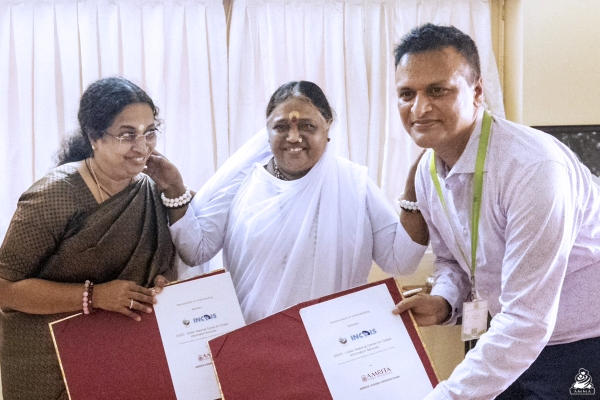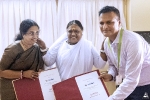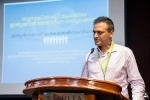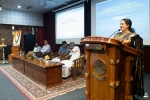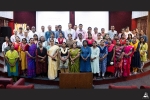Amrita Vishwa Vidyapeetham has signed a five-year Memorandum of Understanding (MoU) with the Indian National Centre for Ocean Information Services (INCOIS), Ministry of Earth Sciences, Govt of India. This milestone initiative at the university aims to provide practical measures for people in coastal areas when emergencies strike. The agreement addresses community resilience, hazard & disaster preparedness, joint research & development, and collaborative courses.
The MoU is on behalf of the Amrita School for Sustainable Development, UNESCO Chair on Experiential Learning for Sustainable Innovation & Development, and Amrita Center for Wireless Networks & Applications. It was jointly signed by Dr Srinivasa Kumar, Director, INCOIS, and Dr Maneesha Vinodini Ramesh, Amrita’s Provost and took place in the presence of Amma, who is the university’s Chancellor. Dr. TVS Udaya Bhaskar with the Ocean Data Management Division and Mr B Ajay Kumar with the Operational Ocean Services Division also graced the occasion.
“INCOIS is happy to collaborate with Amrita Vishwa Vidyapeetham. This MoU will strengthen collaborative research between the academic and scientific community, thereby enhancing the scope and reachability of INCOIS operational ocean forecasts to the coastal population,” said Dr Kumar.
“Further, the tsunami-ready community recognition program proposed under this MoU will enhance the capacity of coastal communities to effectively prepare and respond to tsunamis and other ocean-related hazards.”
Dr Ramesh is also the university’s UNESCO Chair on Experiential Learning for Sustainable Innovation & Development. She explained, “We are excited to enter this collaborative partnership with INCOIS and aim to bring sustainable solutions that build community resilience for the coastal population.
“By blending multidisciplinary domains and technology-based interventions, Amrita and INCOIS will work towards developing an impact-based early-warning assessment of natural hazards. These include the detection of tsunamis, storms, and high wave sea-level changes to help enhance the climate readiness of the maritime community. Along with this, several academic and research collaborations are planned for areas such as joint courses, faculty exchange, and R&D activities.”
The village of Alappad in the Kollam district of Kerala was one of the worst hit places during the 2004 Indian Ocean Tsunami. As part of the MoU, INCOIS and the Alappad Grama Panchayat, the village’s local government, joined hands with UNESCO to launch the Tsunami Ready Program. It is a community performance-based initiative by UNESCO’s Intergovernmental Oceanographic Commission (IOC) that aims to prepare people for tsunamis through collaboration with the public, community leaders, and national and local emergency management agencies.
Mr Ullas Unni, President, Alappad Grama Panchayat, Dr Sreeja Unnikrishnan, a Hazard Analyst with Kollam’s District Disaster Management Authority, and Mr R Ranganathan, Chief Coordinator, AmritaSREE Self-Help Groups also joined the event.
Tsunami Ready builds resilient communities through awareness and preparation strategies that will protect life, livelihoods, and property from tsunamis. The first meeting was held with 11 ward members, the Panchayat President, Alappad community members, and Amrita faculty and students. After Alappad, the program is set to be extended to neighboring coastal regions.
Dr Unnikrishnan addressed the high value of educating people about steps to take in advance of disasters, alongside ensuring effective evacuation mechanisms. She especially extended her whole-hearted support to prepare the community for another tsunami.
Mr Ranganathan spoke about how AmritaSREE was launched as a response to the 2004 Tsunami by imparting vocational training in 21 areas to women from the coastal communities. He lauded the efforts of Amma in relief, rehabilitation, and building community resilience in the coastal region in the wake of disasters. AmritaSREE has been able to instill its members with new pathways to earn for their families that are not dependent upon nature’s increasingly irregular cycles, especially for fishing and farming.
Over the past few decades, India has witnessed a significant rise in climatic events and natural disasters, particularly along the coastlines. Guided by Amma and inspired by the UN Sustainable Development Goals 2030, Amrita has been at the forefront of providing short-term and long-term relief. Some of the technological innovations include:
• OceanNet to provide Internet connectivity for fishers at sea
• Amrita Kripa Mobile App for effective and timely management of relief and rehabilitation efforts during emergencies
• Amrita Unmanned Aerial Systems to remotely drop medical payload and other supplies during disasters
Photo 1: Dr Maneesha Vinodini Ramesh with Amrita and Dr Srinivasa Kumar with INCOIS signed the MoU in the presence of Amma, who is the university’s Chancellor.
Photo 2: Dr Kumar spoke about how this MoU will strengthen collaborative research between the academic and scientific community.
Photo 3: Dr Ramesh addressed how the agreement aims to develop sustainable solutions that build community resilience for the coastal population in the face of disasters.
Photo 4: The MoU includes bringing together members of the village of Alappad to participate in UNESCO’s Tsunami Ready program. Alappad was one of the communities worst hit by the 2004 Indian Ocean Tsunami.



